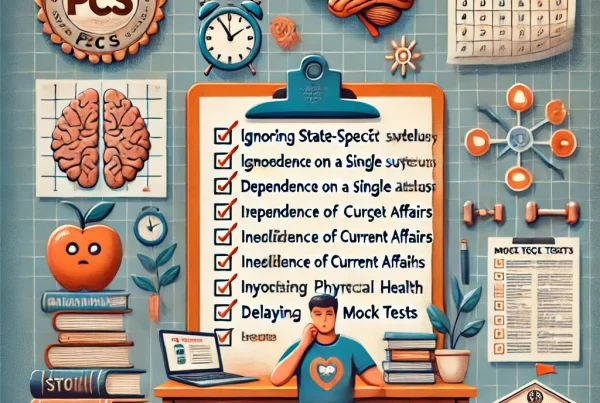How to Explain Your Career Transition in UPSC Interview
Transitioning careers is often a significant decision, and explaining your career transition in UPSC interview requires a thoughtful and well-articulated approach. The UPSC interview panel may probe into your reasons for making the shift, your readiness for the challenges of civil services, and how your previous experience can add value to governance.
This blog will help you craft a compelling narrative about your career transition in UPSC interview, ensuring your response is convincing, strategic, and aligned with the expectations of the panel.
Understanding the Importance of Career Transition in UPSC Interview Questions
Explaining a career transition in UPSC interview is more than just stating your reasons. The panel evaluates:
- Clarity of Purpose
Whether you have a clear understanding of why you shifted from your previous career to civil services. - Commitment to Public Service
Your decision must reflect genuine motivation to contribute to society. - Transferable Skills
How your previous profession has equipped you with skills relevant to public administration. - Alignment with Civil Service Values
Your ability to link the transition with values like integrity, service orientation, and empathy.
Key Elements to Address in Your Career Transition in UPSC Interview Narrative
1. Your Professional Background
Start by summarizing your professional journey before preparing for civil services. Highlight achievements, responsibilities, and learnings that define your career.
Example:
“As a software engineer at ABC Ltd., I worked on projects that required critical thinking, teamwork, and problem-solving. This experience sharpened my analytical skills and ability to deliver under tight deadlines.”
2. Motivation for Transition
Clearly articulate what inspired you to transition into civil services. This could include your desire to serve society, your interest in governance, or your realization of systemic challenges in your previous profession.
Example:
“While I found my corporate role intellectually fulfilling, I felt a growing need to contribute directly to addressing societal challenges. Civil services offer a platform to make a meaningful impact at the grassroots level.”
3. Transferable Skills
Explain how your previous experience can add value to your role as a civil servant. Relate specific skills or knowledge to administrative responsibilities.
Example:
“My project management experience taught me to coordinate diverse teams and manage resources effectively—skills that are crucial for implementing government schemes.”
4. Readiness for Civil Services
Reassure the panel of your preparedness for the responsibilities and challenges of civil services.
Example:
“I am fully aware of the diverse challenges in civil services, from managing crises to resolving conflicts. My adaptability and strong work ethic have prepared me to navigate such situations effectively.”
5. Long-Term Vision
End your narrative with a forward-looking statement about your aspirations in civil services.
Example:
“I envision leveraging my technical expertise to drive digital governance initiatives and improve service delivery in underserved areas.”
Strategies to Handle Career Transition in UPSC Interview Questions
1. Be Honest and Authentic
- Share genuine reasons for your transition without exaggerating or fabricating stories.
- Highlight your commitment to public service and problem-solving.
2. Emphasize Your Growth Mindset
- Frame your transition as a journey of learning and growth, emphasizing how it has prepared you for civil services.
Example:
“My transition was not an escape but an evolution of my career path, driven by my passion for creating tangible change.”
3. Address Potential Concerns Proactively
- Anticipate questions like “Why leave a stable career?” or “How do you handle uncertainty?” and address them calmly.
Example:
“While my previous career offered stability, I was drawn to the dynamic and impactful nature of civil services, which aligns better with my aspirations.”
4. Avoid Negative Statements
- Do not criticize your previous profession or frame it as a dead-end. Instead, focus on how it added value to your journey.
Example:
“My corporate career provided invaluable skills and insights, but I wanted to expand my impact beyond organizational boundaries to serve the nation.”
Common Scenarios of Career Transition in UPSC Interviews
1. From Corporate Sector to Civil Services
Question: “Why leave a high-paying corporate job for civil services?”
Answer:
“My corporate experience developed my strategic thinking and leadership abilities. However, I wanted to apply these skills in a way that directly benefits society. Civil services offer the opportunity to work on policies and programs that can uplift millions.”
2. From Medicine to Civil Services
Question: “Why switch from medicine to administration?”
Answer:
“As a doctor, I witnessed systemic challenges in public healthcare delivery. This motivated me to address these issues at a policy level, ensuring better access and equity in healthcare.”
3. From Academics to Civil Services
Question: “What prompted your shift from academia to administration?”
Answer:
“Teaching allowed me to shape individual lives, but I wanted to address systemic issues in education. Civil services provide a broader platform to reform education systems and ensure inclusive development.”
4. From Engineering to Civil Services
Question: “Why did you choose administration after engineering?”
Answer:
“My engineering background honed my problem-solving skills, which I aim to apply in areas like infrastructure development, digital governance, and innovation in public service delivery.”
Tips to Prepare for Career Transition in UPSC Interview Questions
1. Reflect on Your Journey
Analyze your motivations, experiences, and aspirations. Practice articulating them concisely.
2. Practice Mock Interviews
Simulate career-related questions in mock interviews to build confidence and clarity.
Enroll in:
UPSC Interview Guidance Program 2024
3. Study Examples of Successful Transitions
Learn from the stories of notable civil servants who transitioned from other careers to administration.
4. Stay Updated on Relevant Policies
Link your previous experience to government initiatives like Digital India, Make in India, or Skill India.
Resources for Preparation for Career Transition in UPSC Interview
1. SleepyClasses Programs
2. Online Platforms
- Wikipedia for researching professionals who made career transitions.
- PIB for government initiatives and success stories.
3. Books
- Wings of Fire by Dr. A.P.J. Abdul Kalam for inspiration.
- Indian Polity by M. Laxmikanth to understand administrative structures.
4. Reports
- Economic Survey to relate your professional expertise to economic and administrative challenges.
Mistakes to Avoid
- Being Defensive
- Avoid justifying your transition excessively. Focus on the positives.
- Vagueness
- Provide specific reasons and examples rather than generic responses.
- Negative Remarks
- Avoid criticizing your previous career or framing it as unfulfilling.
- Overemphasis on Financial Factors
- Do not highlight monetary reasons as the primary motivation.
Conclusion
Explaining your career transition in UPSC interview is an opportunity to showcase your clarity, motivation, and readiness for civil services. By presenting your journey as a thoughtful and strategic decision, you can turn career-related questions into a compelling narrative that highlights your suitability for public administration.
Good luck with your UPSC interview preparation!




